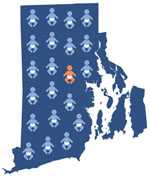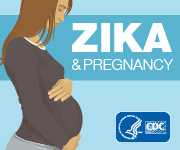Birth Defects Tracking in Rhode Island
Rhode Island Birth Defects Program

1 in 21 babies born in Rhode Island has a major birth defect.
The Rhode Island Birth Defects Program (RIBDP) is essential for understanding the impact of birth defects in the state. The program identifies babies and children with birth defects and assures that these children receive the health services they need in a timely manner.
Common. Costly. Critical.
- Of the 10,500 babies born in Rhode Island each year, about 350 babies (1 in 30) are born with a birth defect.
- Birth defects are costly – hospital costs for the treatment of birth defects are more than $2.5 billion each year in the United States. Between 2010 and 2012, total hospital costs for newborns with a birth defect in Rhode Island were about $108 million, which translates to $77,900 per newborn with a birth defect. Hospital costs for newborns without a birth defect were about $12,480.
- Babies born with a birth defect are more likely to die before their first birthday, compared to babies born without a birth defect. Among the 100 Rhode Island infants who died during 2014-2015, 8 (8%) of those deaths were due to a birth defect.

About the Program
The RIBDP is a system that tracks the number of babies born with birth defects each year and tries to understand what causes birth defects. One of 14 birth defects programs that receive a grant funded by CDC’s National Center on Birth Defects and Developmental Disabilities, the RIBDP, monitors about 10,500 babies born in Rhode Island each year.
The program works closely with healthcare providers, community partners, and families to improve the services available to children with birth defects, as well as develop strategies to help mothers reduce their chance of having a baby with a birth defect. RIBDP also works with the CDC’s National Center on Birth Defects and Developmental Disabilities, the National Birth Defects Prevention Network and the New England Birth Defects Consortium. Some of RIBDP’s partners are March of Dimes-RI/Southeast, MA Market, Women and Infants Hospital, Hasbro Children’s Hospital, RI Parent Information Network, Family Voices of RI, Down Syndrome Society of RI, and the RI Early Intervention Program, and Planned Parenthood of Southeast New England.
The RIBDP works to:
- Identify children in Rhode Island up to age five who have a birth defect
- Understand who is at risk in order to develop strategies to help reduce birth defects and address issues of burden and disparity
- Connect families of babies with a birth defect with local resources and services on a timely basis
- Develop preventive and educational strategies that target women who are at increased risk for having a baby with a birth defect
Program in Action
- Promotes folic acid: Through a collaboration with the Rhode Island Family Planning Program, multivitamins containing folic acid have been distributed to over 1,000 women. These multivitamins can help prevent some serious birth defects of the brain and spine.
- Improves birth defects tracking: In Rhode Island, birth defects are a reportable condition. The RIBDP has developed an online reporting system for physicians, pediatric practices, and laboratories to report birth defects to the RIBDP. This allows the RIBDP to track birth defects across the state.
- Disseminates data: The RIBDP shares information with healthcare providers, policy makers, community organizations, and families to increase awareness about birth defects.
- Educates healthcare professionals: January is National Birth Defects Prevention Month. During this month, RIBDP coordinates with the March of Dimes and Children’s Hospital to schedule presentations for pediatric healthcare providers that bring attention to birth defects. Community partners and families are also invited to participate in these presentations.
- Refers to services: The RIBDP wants to make sure that families of children with birth defects are able to receive the referrals and services they need. Families of children with birth defects can fill out forms, which are condition-specific, to tell RIBDP about the medical, developmental, educational, and support services they received. RIBDP continually works to fill gaps in family support referrals and services that are identified through this process.
Making a Difference
“The Rhode Island Department of Health Birth Defects Program has been instrumental in helping us track the care of our patients in the craniofacial program. Their commitment to careful data collection allows us to monitor referrals and improve comprehensive care for these children.”
— Helena Taylor, MD, PhD, Chief of Craniofacial Surgery, Rhode Island Hospital and Assistant Professor of Plastic Surgery, Brown University Warren Alpert Medical School
More Information
For more information on the Rhode Island Birth Defects Program, visit the their website or email samara.viner-brown@health.ri.gov.
- Page last reviewed: June 12, 2017
- Page last updated: June 26, 2017
- Content source:



 ShareCompartir
ShareCompartir